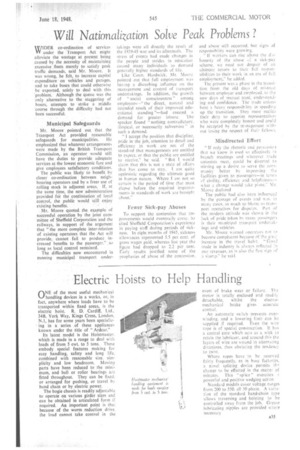Will Nationalization Solve Peak Problems ?
Page 53

If you've noticed an error in this article please click here to report it so we can fix it.
WIDER co-ordination of services VY under the Transport Act might alleviate the wastage at present being caused by the necessity of maintaining excessive .fleets merely to satisfy peak traffic demands, said Mr. Moore. It was wrong, he felt, to increase capital
• expenditure on Vehicles and garages, and to take buses that could otherwise be exported, solely to deal with this :problem. Although the queue was the only alternative to the staggering of hours, attempts to strike a middle coUrse through the difficulty had not been successful.
Municipal Safeguards
• Mr. Moore pointed out that the Transport Act provided reasonable safeguards for municipalities. He emphasized that whatever arrangements were made by the British Transport Commission, an operator would still have the duties to provide adequate services at the lowest economic fare and give employees satisfactory conditions.
The public was likely to benefit by closer co-ordination between neighbouring operators and by a freer use of rolling stock in adjacent areas. If, at the same time, the new administration provided for the continuation of local control, the public would still enjoy existing benefits.
Mr. Moore quoted. the exampleof successful operation by the joint committee of Sheffield Corporation and the railways, in support of the argument that "the more complete inter-relation of existing operators that the Act will provide, cannot fail to produce increased benefits to the passenger." ,so long as local control remained.
The difficulties now encountered in running municipal transport under takings were an directly the result of the 1939-45 war and its aftermath. The stress of events had made changes in the people and strides in education caused many individuals to demand generally higher Standards of life.
Like Coon, Hardwick, Mr. Moore pointed out that full employment was having a disturbing influence on the management and control of transport undertakings, In addition, the growth of social consciousness " among employees----" the direct, natural and intended result of their improved educational standing "—had created a demand for greater leisure. The speaker found "nothing contradictory. illogical, or necessarily subversive " in such a demand.
" I accept the position that discipline. pride in the job, attention to detail and efficiency in work are not of the standard that managements are entitled to expect, or that the public are entitled to receive," he said. " But I would claim that this is not a state of affairs that has come to stay. I am quite optimistic regarding the ultimate good in human nature. Where I am not so certain is the period of time that must elapse before the required improvements in standards of work are brought about."
Fewer Sick-pay Abuses To support the contention that improvements would eventually come. he cited Sheffield Corporation's experience in paying staff during periods of sickness. In eight months of 1945, sickness allowances represented 5.5 per cent. of gross wages paid, whereas last year the figure had dropped to 2.2 per cent. Early. results justified some of the prophesies of abuse of the concession.
and abuse still occurred, but signs of responsibility were growing.
'' If workers can rise above the dishonesty of the abuse of a sick-pay scheme. We need not despair of al ultimate return to their full responsibilities to their work in an era of full employment," he added.
The present was a phase in the transition from the old days of mistrust between employer and employed. to the new days of mutual trust, understanding and confidence. The trade unions bore a heavy responsibility in speedire up the transition. They most realize their duty to appoint representatives who were completely honest and could be accepted by the management without losing the respect of their fellows.
Misdirected Effort If only the rhetoric and persuasiol that we know is used so effectively ii branch meetings and \sherever trade unionists meet, could be diverted to stirrine up a desire to serve the community better by improving the facilities given to passengers--in term; of civility. efficiency and helpfulness-what a change ss ould take place," Mr. Moore declared
The public had also been influenced by the passage of events and was, in many cases, as much to blame as transport operatives for disputes. Part of the modern attitude was shown in the lack of pride taken be many passeneers is their municipal transport underakings and vehicles.
Mr. Moore warned operators not to become complacent because of the greal increase in the travel habit. " Good trade in industry is always reflected :n our revenues, as is also the first sign of a slump," he said.




















































































